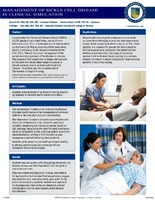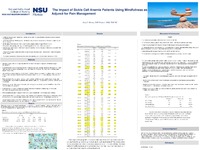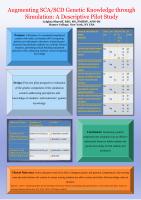| dc.contributor.author | Eti, Deborah | en |
| dc.contributor.author | Ukot, Eme | en |
| dc.date.accessioned | 2016-03-17T13:01:59Z | |
| dc.date.available | 2016-03-17T13:01:59Z | |
| dc.date.issued | 2016-03-17 | |
| dc.identifier | INRC15PST236 | |
| dc.identifier.uri | http://hdl.handle.net/10755/602029 | |
| dc.description | <p>Research Congress 2015 Theme: Question Locally, Engage Regionally, Apply Globally. Held at the Puerto Rico Convention Center.</p> | en |
| dc.description.abstract | <p>Session presented on Saturday, July 25, 2015:</p>
<p><strong>Purpose:</strong> Sickle cell disease is the most common inherited blood disorder in the United States. It affects 90,000 to 100,000 people, most of whom are African Americans (CDC, 2012). There is currently no cure and management of the symptoms and progression of the disease can be complex. The demand for highly qualified graduate nurses continues to rise, and instructors have met this demand by using innovative technology like simulations to ensure nursing students are trained to the high level required in today's work environment. The purpose of this project was to design and evaluate a simulation that would better prepare students to provide optimal patient care to those with Sickle Cell Disease. The setting was the simulation lab at a local college of nursing in Houston, Texas.</p>
<p><strong>Methods:</strong> The methodology included a pre- and post-conference of student performance in the management of sickle cell patients in the simulation lab and clinical setting. The intervention included a simulation covering the care of a sickle cell patient in crisis. Areas focused upon were: recognizing the microcytic anemia based on CBC readings, recognizing the need for blood transfusion based on hemoglobin level, obtaining patient consent for blood transfusion, utilizing a PCA for optimum pain management and administering blood products. They participated in a pre-briefing and post-briefing to address patient status and continuum of care throughout the simulation stages.</p>
<p><strong>Results:</strong> Students in the Bachelor of Science nursing program participated in the adult health rotation simulation. Students became familiar with interpreting lab results, the disease process, and how important it is to recognize a true sickle cell crisis. They also utilized prioritization of nursing interventions for best practice that included fluid resuscitation, oxygen administration and most importantly pain relief. At the end of the simulation, students realized how important it is to adequately treat sickle cell disease to prevent unfortunate complications such as renal disease, heart disease, and infections.</p>
<p><strong>Conclusion:</strong> Patients with chronic painful diseases such as sickle cell are often challenging to even the most experienced nurses. When assigning student nurses to care for these patients, it is important to provide the best support so that the experience is a positive one for the patient and health care professionals. Ensuring a constructive approach and evidenced based practice to a complex situation can result in better outcomes for these complex patients in the clinical setting.</p> | en |
| dc.format | Text-based Document | en |
| dc.language.iso | en | en |
| dc.subject | Sickle Cell Disease | en |
| dc.subject | Simualton | en |
| dc.subject | Nursing Students | en |
| dc.subject.mesh | Students, Nursing | en |
| dc.title | Management of sickle cell disease in clinical simulation | en |
| dc.type | Poster | en |
| dc.rights.holder | <p>
All rights reserved by the author(s) and/or publisher(s) listed in this item record unless relinquished in whole or part by a rights notation or a Creative Commons License present in this item record.
</p><p>
All permission requests should be directed accordingly and not to the Sigma Repository.
</p><p>
All submitting authors or publishers have affirmed that when using material in their work where they do not own copyright, they have obtained permission of the copyright holder prior to submission and the rights holder has been acknowledged as necessary.
</p> | en |
| dc.description.note | <p>Items submitted to a conference/event were evaluated/peer-reviewed at the time of abstract submission to the event. No other peer-review was provided prior to submission to the Henderson Repository.</p> | |
| dc.type.category | Full-text | en |
| dc.evidence.level | N/A | en |
| dc.research.approach | N/A | en |
| dc.subject.cinahl | Anemia, Sickle Cell | en |
| dc.subject.cinahl | Simulations | en |
| dc.contributor.department | Phi Pi | en |
| dc.author.details | Deborah Eti, RN; Eme Ukot, RN | en |
| dc.conference.name | 26th international Nursing Research Congress | en |
| dc.conference.host | Sigma Theta Tau International | en |
| dc.conference.location | San Juan, Puerto Rico | en |
| dc.date.conferenceyear | 2015 | |
| dc.description.reviewtype | Abstract Review Only: Reviewed by Event Host | en |
| dc.description.acquisition | Proxy-submission | en |





